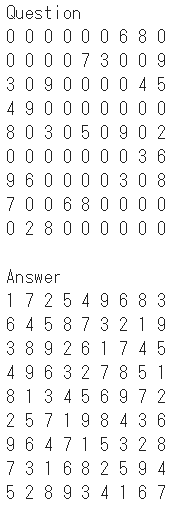Reference
Sample Code
class Sudoku():
def __init__(self):
self.solution = None
def print_grid(self, grid):
for row in grid:
#print(' '.join([str(x) for x in row if x != 0]))
print(' '.join([str(x) for x in row]))
def copy_grid(self, grid):
return [row[:] for row in grid]
def check_rows(self, grid):
'''check rows for constraint validity'''
for row in grid:
xs = []
for x in row:
if x == 0:
continue
if x in xs:
return False
xs.append(x)
return True
def check_cols(self, grid):
'''check columns for constraint validity'''
n = len(grid)
cols = [[row[i] for row in grid] for i in range(n)]
return self.check_rows(cols)
def check_sub_grids(self, grid):
'''check sub-grids for constraint validity'''
n = len(grid)
m = int(n ** 0.5)
# sub-grids exist for squared grids only
if m*m != n:
return True
for i in range(m):
for j in range(m):
sub_grid = [row[j*m:(j+1)*m] for row in grid[i*m:(i+1)*m]]
xs = []
for row in sub_grid:
for x in row:
if x == 0:
continue
if x in xs:
return False
xs.append(x)
return True
def check_solution(self, grid):
'''check solution grid for goal validity'''
return sum([row.count(0) for row in grid]) == 0
def solve(self, grid, spots, x):
# all spots filled: stop searching
if len(spots) == 0:
return
# another search solved the grid: stop searching
if self.solution != None:
return
# set the (i, j) cell to x
(i, j) = spots[0]
grid[i][j] = x
# the grid is invalid: stop searching
is_grid_valid = self.check_rows(grid) and self.check_cols(grid) and self.check_sub_grids(grid)
if is_grid_valid == False:
return
# the grid is valid and solved: stop searching
is_grid_solved = self.check_solution(grid)
if is_grid_solved == True:
self.solution = grid
return
# here, the grid is valid but not solved: continue searching
for x in range(n):
spots1 = spots[1:] # clone `spots` array starting from 1st index
self.solve(self.copy_grid(grid), spots1, x+1)
Output
grid3 = [[2, 0, 3],
[1, 0, 0],
[0, 0, 1]]
grid4 = [
[4, 0, 0, 0],
[0, 2, 0, 4],
[2, 0, 3, 0],
[0, 0, 0, 2]
]
grid9 = [
[0, 0, 0, 0, 0, 0, 6, 8, 0],
[0, 0, 0, 0, 7, 3, 0, 0, 9],
[3, 0, 9, 0, 0, 0, 0, 4, 5],
[4, 9, 0, 0, 0, 0, 0, 0, 0],
[8, 0, 3, 0, 5, 0, 9, 0, 2],
[0, 0, 0, 0, 0, 0, 0, 3, 6],
[9, 6, 0, 0, 0, 0, 3, 0, 8],
[7, 0, 0, 6, 8, 0, 0, 0, 0],
[0, 2, 8, 0, 0, 0, 0, 0, 0],
]
grid = grid9
n = len(grid)
# list all spots
spots = []
for i in range(n):
for j in range(n):
if grid[i][j] == 0:
spots.append((i, j))
s = Sudoku()
print ('Question')
s.print_grid(grid)
print ()
# solve grid
for x in range(n):
s.solve(s.copy_grid(grid), spots, x+1)
print ('Answer')
s.print_grid(s.solution)
